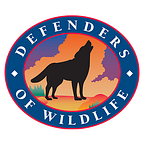The Senate: Bringing us Closer to a Wildlife-Friendly Farm Bill
The House of Representatives and the Senate have each passed their versions of the 2018 Farm Bill. And now comes the hard part: reconciling these very different bills. Compared to the House bill, the Senate bill includes a number of provisions to conserve wildlife and habitat and avoids undermining federal environmental laws. The two chambers are expected to proceed to conference this summer to draft a final Farm Bill.
Defenders’ involvement with the Farm Bill is guided by our comprehensive recommendations for enhancing wildlife conservation in the 2018 legislation. The following compares a number of our priority recommendations with the Senate Farm Bill.
Poison Pill Provisions
Unlike the like House bill, the Senate legislation is generally free from riders that undermine bedrock environmental laws, such as the Endangered Species Act, the National Environmental Policy Act, and the Clean Water Act. These statutes require robust public planning for natural resource management and protect our nation’s endangered species, and public lands and waters. As the Farm Bill proceeds through the legislative process, we urge Congress to ensure that all anti-environmental riders such as the ‘Poisoned Pollinators Provision’ included in the House bill never become law.
Species Conservation
Both the House and Senate recognize the importance of wildlife conservation by adding Species of Greatest Conservation Need (SGCN) identified in State Wildlife Action Plans as a purpose of the Healthy Forests Reserve Program (HFRP). HFRP offers landowners restoration agreements and easements to support specific management actions on private lands that contribute to species conservation. Defenders encourages legislators to extend this treatment of SGCN to other Farm Bill programs and initiatives.
Conservation Funding and Technical Assistance
Unlike the House bill that cuts conservation spending by nearly $800 million over ten years, the Senate bill avoids cutting funding in the Conservation Title. However, neither bill addresses the critical need for adequately funding the Conservation Technical Assistance (CTA) program. Landowners depend on CTA to provide assistance with implementing voluntary conservation practices on their land.
Habitat Connectivity
The Senate bill provides new support for habitat connectivity for wildlife, as recommended by Defenders. Thanks to Senator Bennet (D-CO), one provision directs the Conservation Reserve Program (CRP) to prioritize enrollment of privately owned grasslands that are at risk of agricultural conversion or development, or lands of ecological significance, that may improve or create wildlife habitat corridors. Another provision gives priority for CRP enrollment of land designated as a State Acres for Wildlife Enhancement (SAFE) area that protects wildlife corridors.
Climate Change
The Senate bill offers exciting new opportunities to mitigate and address the effects of climate change. It establishes a soil health demonstration pilot project under the Environmental Quality Incentives Program (EQIP) and provides payments under the Conservation Stewardship Program (CSP) for landowners to sow cover crops to prevent erosion and support soil carbon sequestration. The Senate bill also amends CSP to help producers improve land resilience to increasing weather volatility. Finally, the bill provides new direction to manage EQIP and CSP to enhance soil health.
Reauthorization of the Conservation Stewardship Program
The House Farm Bill recklessly eliminates CSP, the nation’s largest conservation program by acreage. The Senate bill reauthorizes the program but shifts some funding for CSP to other conservation programs, such as the Regional Conservation Partnership Program (RCPP) and the Agricultural Conservation Easement Program.
Funding for Wildlife
The Senate Farm Bill doubles the minimum amount of funding for EQIP dedicated to wildlife conservation practices to ten percent, thanks to the efforts of Senators Bennet (D-CO) and Daines (R-MT). This amendment could be even stronger if the 10 percent minimum was required per state, rather than a general, national increase, to ensure that all states allocate a minimum of ten percent of EQIP funds to wildlife conservation.
Native Prairie Conservation
The Senate Farm Bill makes a small improvement to the existing “Sodsaver” program. Sodsaver reduces taxpayer-funded incentives to landowners who convert native grasslands to cropland in six states of the Prairie Pothole Region. Thanks to an amendment from Senators Klobuchar (D-MN) and Thune (R-SD), the Senate bill expands Sodsaver by allowing any state to voluntarily opt-in to the program. While this is an important step forward, we would like to see this provision strengthened by making Sodsaver a mandatory, nationwide program, so that landowners in other grassland states are not incentivized to convert native habitat to agriculture.
Wildlife Coexistence
The Senate Farm Bill missed an opportunity to support a popular and important conservation measure for wildlife. An amendment offered by Sens. Udall (D-NM) and Booker (D-NJ) would have formalized non-lethal predator deterrence practices as eligible for support under EQIP. Their amendment would have supported landowners and producers to implement agricultural practices that reduce wildlife conflict and promote coexistence. This amendment did not make it into the Senate bill.
Measuring Outcomes
The Senate Farm Bill also missed an opportunity to recognize the importance of measuring outcomes of conservation programs. Measuring outcomes helps ensure that limited resources are targeted to where they are proven to be most effective. Such an amendment was offered by Sen. Casey (D-PA), but it did not make it into the Senate bill.
As the largest source of federal funds for habitat conservation, the Farm Bill has major implications for wildlife and our environment. Reauthorizing the legislation, which occurs approximately every five years, is an opportunity to make improvements on the previous iteration. Defenders of Wildlife will continue our robust engagement in this process to ensure that Congress passes joint legislation that works for wildlife.
